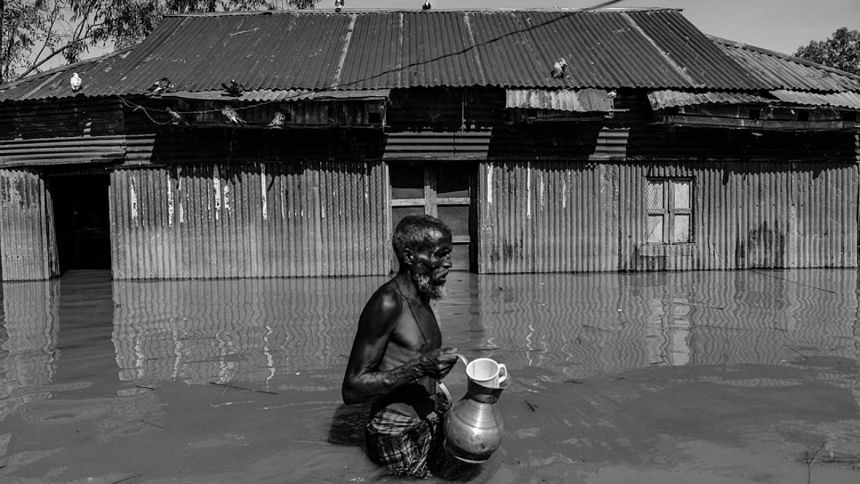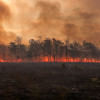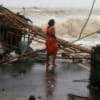Adaptation strategies for climate change impacts in Bangladesh

The World Risk Index 2023 ranks Bangladesh ninth worldwide for climate disaster risk. By 2050, Bangladesh will lose 17 percent of its territory due to rising sea levels, resulting in the loss of 30 percent of the country's agricultural land. The rise in sea levels in coastal areas is prompting mass migration into cities, further straining the country's resources. With a disaster risk score of 27.29, Bangladesh is highly vulnerable to natural hazards such as floods, cyclones, and coastal erosion.
Coastal erosion and rising sea levels
Bangladesh's geography makes it especially prone to the impacts of climate change. With a flat landscape and a significant portion of the country lying below five meters above sea level, rising sea levels present a dire threat. The coastal regions, home to millions, are facing erosion and salinisation, rendering fertile land unsuitable for agriculture. A projected loss of 17 percent of Bangladesh's landmass would displace millions of people, many of whom depend on agriculture and fishing for their livelihood.
To address these challenges, the Bangladeshi government has taken the lead in integrating migration into its climate adaptation strategies. Government funding, combined with international support, has focused on providing climate-vulnerable communities with more secure housing and sustainable livelihood opportunities. Initiatives have targeted areas along the coast and encouraged internal migration to secondary cities, such as Mongla, in an attempt to reduce pressure on major urban centres. Notably, former UN Secretary General Ban Ki-moon and Patrick V Verkooijen, head of the Global Center on Climate Adaptation, have praised Bangladesh as a "global pioneer in preparing for climate migrants."
Agricultural disruption and migration pressures
Climate change is severely disrupting Bangladesh's agricultural sector, the backbone of its economy. The erratic rainfall patterns and more frequent cyclones have caused significant damage to crops. Farmers are struggling to cope with changes to traditional growing seasons, and the increasing salinity of soil in coastal regions is reducing the yield of key crops like rice. As a result, food insecurity is becoming an alarming issue.
This disruption has contributed to internal migration, as families leave rural areas in search of better opportunities. Although most climate-related displacement in Bangladesh remains internal, neighbouring India has also become a destination for migrants, compounding broader migration pressures rooted in cultural, historical, and economic factors. However, international agreements addressing the legal status of climate refugees remain absent, leaving many migrants vulnerable to legal and employment challenges. India's proposed Climate Migrants (Protection and Rehabilitation) Bill 2022, though not yet passed, signals a growing recognition of the issue. The bill sought to create a legal framework to protect climate migrants, ensuring access to employment, education, and other services. While the legislation stalled, it reflects the region's need for coordinated responses to climate migration.
Urban vulnerability: The strain on Dhaka
As rural communities migrate to cities to escape climate impacts, Dhaka, already one of the world's most densely populated cities, is struggling to cope. The capital city is experiencing frequent flash floods due to unplanned urban development and a poor drainage system. As a result, waterlogging has become a regular occurrence during the monsoon season, disrupting the lives of millions. In addition to floods, Dhaka faces extreme heat, exacerbated by the urban heat island effect. With minimal green spaces and insufficient infrastructure to handle the surging population, the city's resilience to climate impacts is being tested.
Government-led adaptation efforts
Bangladesh has been proactive in its efforts to combat the impacts of climate change. The Bangladesh Climate Change Strategy and Action Plan (BCCSAP) serves as the country's blueprint for adaptation and resilience. This plan includes significant investments in flood defences, early warning systems, and disaster shelters. Over the years, Bangladesh has gained international recognition for its disaster preparedness, especially in reducing cyclone-related deaths through improved warning systems and the construction of cyclone shelters. Despite these efforts, the magnitude of the climate crisis is making it increasingly difficult to keep up. Bangladesh, as a developing country, faces constraints in terms of finance and technical resources. Many of its adaptation projects remain underfunded, with gaps in data and knowledge limiting the effectiveness of some interventions.
International support and future prospects
To address the climate crisis, Bangladesh needs more than local efforts. The country has been a vocal advocate for climate finance, urging developed nations to fulfil their commitments to the Green Climate Fund and other international support mechanisms. Global cooperation is crucial, especially as Bangladesh's adaptation efforts require substantial investments. At the international level, Bangladesh is actively involved in climate diplomacy, advocating for more ambitious targets to curb global temperature rise and support vulnerable nations like itself. The Global Goal on Adaptation, a key outcome of the Paris Agreement, aims to enhance the resilience of nations like Bangladesh through financial and technical support.
Dr Rejaul Karim is an associate professor in the Department of Business Administration at Varendra University. He can be reached at [email protected].
Abdul Waaje is a graduate student of the School of Business at Michigan Technological University. He can be reached at [email protected].
Md Mustaqim Roshid is an MBA student in the Department of Management Studies at Rajshahi University. He can be reached at [email protected].
Views expressed in this article are the authors' own.
Follow The Daily Star Opinion on Facebook for the latest opinions, commentaries and analyses by experts and professionals. To contribute your article or letter to The Daily Star Opinion, see our guidelines for submission.

 For all latest news, follow The Daily Star's Google News channel.
For all latest news, follow The Daily Star's Google News channel. 










Comments